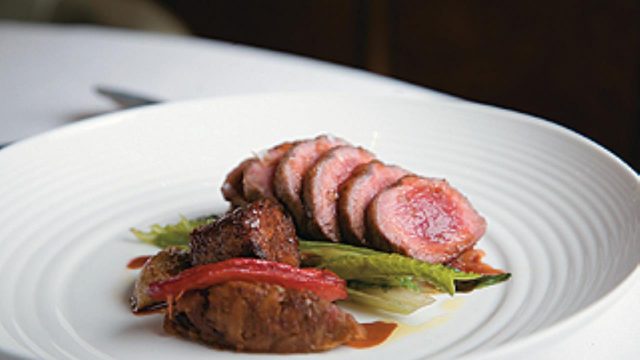New Yorkers make a fetish of being unimpressible. Reputations, however huge, built outside this city are uniformly met with the raised eyebrow of the show-us-what-you’ve-got-then persuasion. Gordon Ramsay, the world-class British chef, no longer the oxymoron it once was, arrived in New York with a firebrand’s temperament, three stars from the Michelin Guide, that ultimate arbiter of affairs culinary, several hit television series, including one in the US, and a global purview that took in Dubai and Tokyo. The Michelin Guide’s only three-starred restaurant in London is Ramsay’s eponymous establishment in Chelsea; by way of comparison, Paris has 10 three-starred restaurants and New York four, down to three now after Alain Ducasse’s high-minded restaurant, Alain Ducasse at the Essex House, closed in January. Ramsay’s New York venture was preceded by two seasons of a reality TV show called Hell’s Kitchen, based on his successful British show of the same name, though the name, punning on a once notoriously grim, gritty Manhattan neighbourhood, has more resonance for a New York audience. So Ramsay arrived with considerable fanfare and his reception has been correspondingly gelid, or worse, lukewarm, tepid with indifference.
A leitmotif has emerged in the reviews of Gordon Ramsay at the London (the restaurant is part of The London NYC, a newly redesigned midtown hotel); the tempestuous, tourettic chef whose restaurant is underwhelmingly tasteful. The critics have taken their cue from the New York Times doyen/panjandrum Frank Bruni whose offhanded dismissal was headlined ‘For a Bad Boy Chef, He’s Certainly Polite’. As gauche readers see in all novels only autobiography, Bruni appears entirely unable to separate Ramsay qua TV personality from Ramsay the cook. But maybe Bruni, for all his absurd fin-de-siécle decadence of whining about the predictability of foie gras and black truffles, is on to something.
Can a restaurant like Gordon Ramsay at the London, where personality is so intrinsic to the restaurant’s appeal to the international moneyed, be reviewed only for its food? Ramsay, like all the Michelin-endorsed cooking elite, is a brand, opening restaurants in every city where people have a few hundred dollars to spare on dinner. It’s not surprising that the city closest to usurping New York’s position as the United States’ fine dining capital is not Los Angeles, San Francisco, or Chicago but Las Vegas. Joël Robuchon, the storied French chef in whose kitchen in France Ramsay finished his education, opened a restaurant in Vegas before New York. And, to the chagrin of vain New Yorkers, Guy Savoy, another much celebrated Paris chef (Ramsay worked under him too during his three-year stint in France), came out of retirement to open a fine dining restaurant in Caesars Palace but has so far resisted New York. Other New York stars such as Ducasse, Daniel Boulud, Thomas Keller and Jean Georges Vongerichten all have Vegas outposts. These chefs are marques; they appeal to the consumer who might also buy Vuitton luggage or Armani suits or Patek Philippe wristwatches, the kind of consumer eager to accumulate and display the international signifiers of the good life. Inevitably, there is a kind of homogenisation and the fatigued critic craves imagination and sometimes novelty.
My own experience, admittedly limited to a single dinner, suggests the people you’re most likely to encounter at Gordon Ramsay at the London are investment bankers and British tourists taking advantage of the weak dollar to indulge a craving for celebrity rather than French-inflected haute cuisine; the kind of people, indeed, you would also encounter on vacation in Vegas or at the business class counter in Shanghai, Tokyo or Dubai. Putting aside such snobberies, I can report that dinner at Gordon Ramsay at the London is a seamless, richly satisfying affair. I particularly liked the caramelised sweetbreads and a superb amuse bouche of chicken liver paté and truffle cream cheese on toast. Yes, Bruni is correct that there are no surprises, that Ramsay’s reflex is to litter dishes with such default luxuries as truffles but, surely, this is not a bad thing. Ramsay’s menus are reassuring, sensible. He is not cutting-edge but at least we are spared the didacticism of chefs at the vanguard. That roasted leg of lamb with caramelised chicory, golden raisins and tomato molasses is not particularly original doesn’t stop it looking (and tasting) wonderful on your plate. I ate fish in the night, red mullet with grapefruit and a perfectly cooked black bass given smoky ballast by chorizo. My dessert, a fondant made with Valrhona (what else?) chocolate and ice cream, provoked my girlfriend into a fit of eye-rolling but it was bloody good. Besides, her scruples were quickly cast aside when the candied honeycomb was wheeled out. Even when Ramsay’s cooking is counterintuitive—bitter chocolate and venison, for instance—the effect is not one of dissonant flavours but of harmony.
Gordon Ramsay at the London is a restaurant for grown-ups—wood and lacquer panelling, chairs upholstered in leather a barely perceptible green (the food provides the colour), and jackets for men. The swiveling chairs are a particularly thoughtful touch. It is a room geared towards inducing a contemplative conviviality, if such a thing is possible. But the bells and whistles of fine dining, all bon bon trolleys and discreet, soft-shoed service, is a plaintive gesturing at the stultifying subtleties of a much older culture at odds with New York’s bustle. Fine as my dinner was, when I left I was gladder than usual for the crunch of pavement under my feet.
Gordon Ramsay at the London, 151 West 54th Street (between 6th and 7th avenues); +1-212-468-8888. Eight-course ‘prestige menu’: $120 per person; a la carte three-course meal: $80 per person




